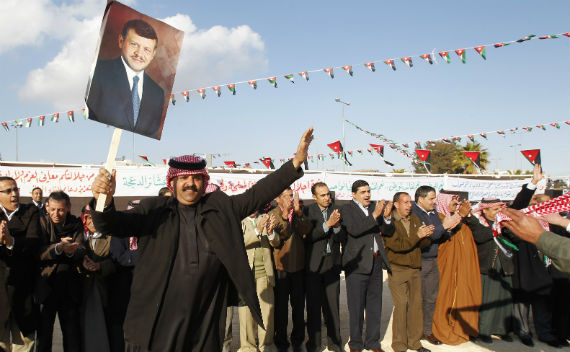Striking Findings in Jordan
More on:

With thousands of Jordanians taking to the streets in many parts of the country over the past few Fridays, one must ask if the Hashemite Kingdom is next in line for a serious uprising. Indeed, the most recent protests have brought together a new partnership of Islamists, leftists, trade unions and independents that recall the coalitions formed in Tunisia late last year that led to the overthrow of the Ben Ali regime.
Yet a new poll, just released by the International Republican Institute, paints a picture of discontent calling for greater reform, not revolution, in Jordan. Some of the poll’s findings are striking. For example, some 60 percent of Jordanians believe that their country is going in the right direction, while only a quarter believe that things are moving in the wrong one. The poll suggests that Jordanians have become more optimistic that the economy will improve over the next twelve months. This is rather remarkable, when surveying overall trends in Jordan’s neighbors, be it Syria, Iraq, Saudi Arabia, or the West Bank.
The poll also indicates that popular movements in Jordan, though active, have not captured the imaginations of ordinary Jordanians in the way they have in neighboring Syria or had in the waning days of Mubarak’s Egypt. Only one in five Jordanians aware of the popular youth movements supported their taking to the streets.
To be sure, the current government of Prime Minister Marouf Bakhit is widely unpopular in Jordan. Only one in ten respondents are satisfied with him or his government’s performance. Yet King Abdullah and his throne are firmly in place. Abdullah will likely accede to popular discontent and remove the prime minister sometime later this year, just as the Hashemite leader removed the previous head of government in February in the face of popular discontent.
Abdullah is taking other steps to keep any discontent focused away from his rule. Two days ago, he promised to hold municipal elections on December 27. Opposition Islamists have threatened to boycott that vote unless the king agrees to the demand that cabinet officials be elected by parliamentary majority, rather than royal fiat. For the king to bend to this demand would dramatically alter the balance of power away from the monarchy within the kingdom. Look to Abdullah to finesse this one without bowing to such a dramatic call.
An equally important indicator of Jordan’s future tranquility will be how King Abdullah addresses the issues of corruption and cronyism, which have been major rallying cries in recent demonstrations. The IRI poll indicates that political reform is a lesser priority to Jordanians than economic reform and fighting corruption. Indeed, only one in ten Jordanians see political reform as a priority, whereas half see bread and butter economic issues as dominant. Ultimately, Jordanian leaders, like their counterparts the world over, are going to have to meet the economic challenges facing their countries to maintain popular support. But in a region brimming with discontent, the degree to which Jordanians do not currently share these sentiments is rather striking.
More on:
 Online Store
Online Store